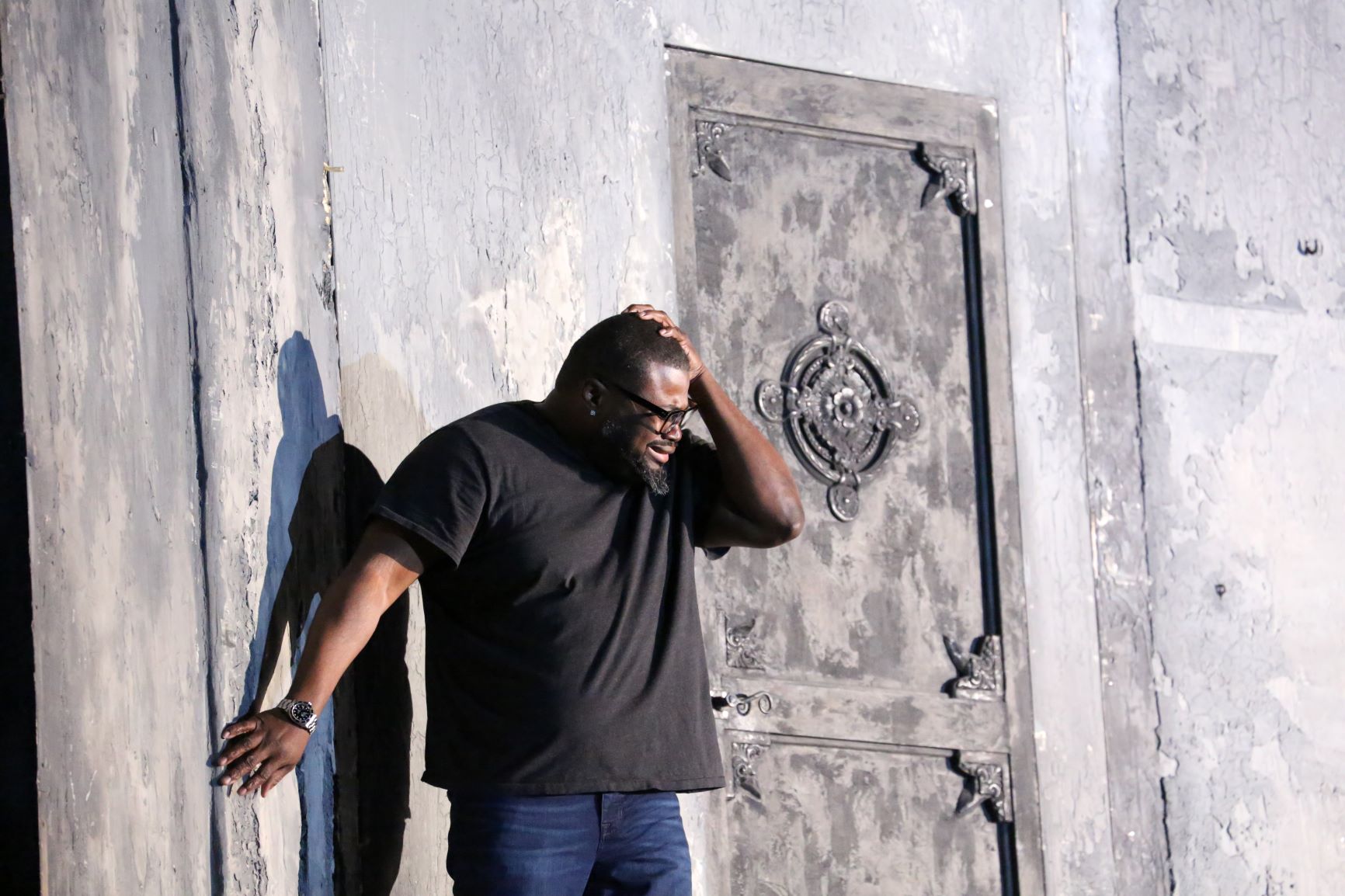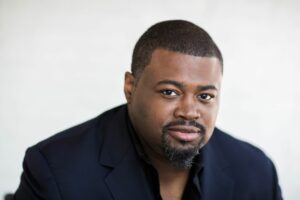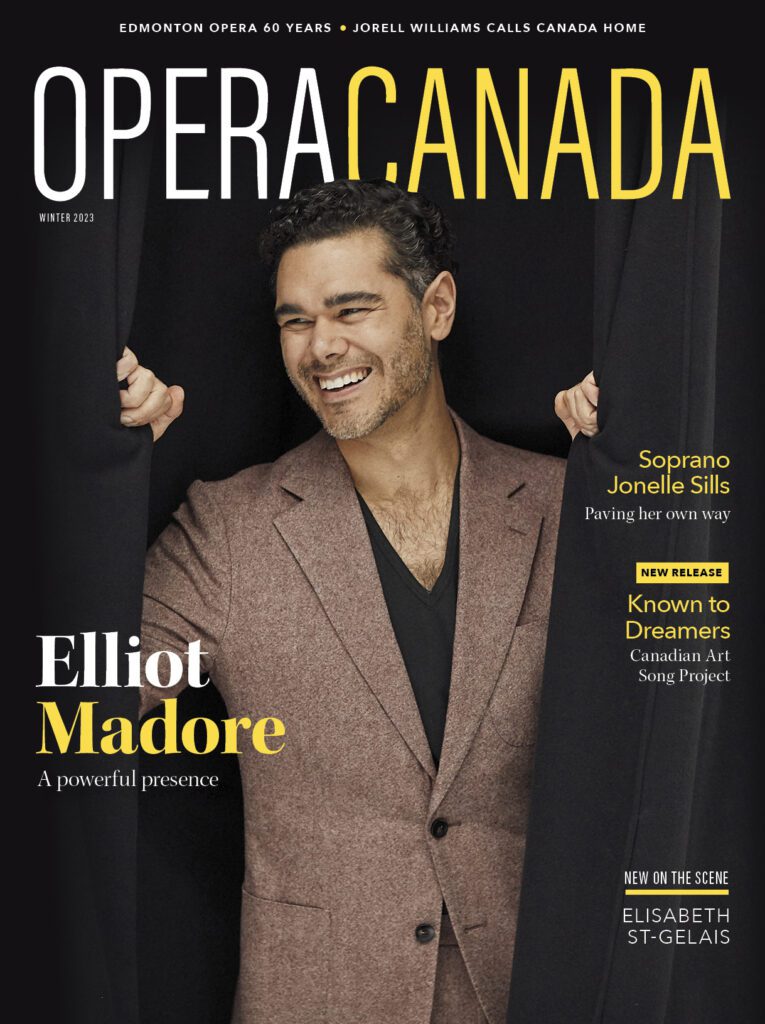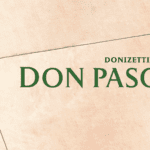Early on in his career, a suggestion was made to tenor Russell Thomas that he only sing Mozart. “I thought that was the biggest insult,” he remembers, laughing. It turned out to be good advice. “When I was in college I sang a lot of repertoire that was probably inappropriate, because I thought I’d be a big-voiced singer. When I got a little bit more mature and started working in young artist studios across the country, I started to dial it back a bit.”
That self-awareness gained the Miami-born tenor a place in Metropolitan Opera’s Lindemann Young Artist Development Program in the early 2000s where James Levine made the Mozart suggestion. “He said, ‘Promise me you will not sing Puccini ever again!’ And I thought to myself, ‘ever?’ I think his idea was that I’d learn to be a better singer and musician, to clean up some things technically and musically by focusing on Mozart, which requires a level of discipline that I didn’t have at 24 or 25.”
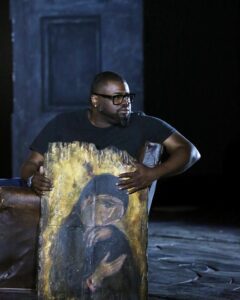
Russell Thomas (Otello) in rehearsal for Canadian Opera Company’s Otello. Photo: Canadian Opera Company
In the decade-plus since that experience, Thomas has not only honed his sense of discipline, but has integrated it into a refined technique, flexible vocalism, bronzed lyricism, and an impressive dynamic range. In the process, he’s become one of the most in-demand tenors of his generation. Performing concert works (he counts Mahler’s “Das Lied von der Erde” as a favourite), as well as opera (including bel canto, Beethoven, Verdi, Adams, and indeed, Puccini), Thomas sings at some of the world’s most prestigious companies including Royal Opera, Covent Garden, Lyric Opera Chicago, and LA Opera. He is also set to make imminent debuts at Bayerische Staatsoper and San Francisco Opera. For his 2017 Salzburg Festival debut, he performed his beloved Mozart in the title role of La clemenza di Tito with conductor Teodor Currentzis and director Peter Sellars. Salzburg will host the same creative team this summer, with Thomas in the title role of Idomeneo. Mozart and Verdi, are in his view, inextricably linked.
“The cleanliness that Mozart requires, the precision, helps the vocal line with Verdi,” he explains. “It helps it be more precise and not just cliché-Italianate. There’s more of an honest musical vocal approach in my performance, or I try for that, because of my experience singing so much Mozart.”
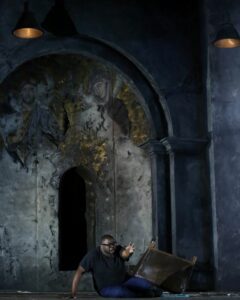
Russell Thomas (Otello) in rehearsal for Canadian Opera Company’s Otello. Photo: Canadian Opera Company
Canadian Opera Company (COC) audiences are well familiar with the Miami-born tenor who debuted with the company in the title role of The Tales of Hoffman in 2012, returned in 2016 as Don José in Carmen and opened the 2016/17 season opposite soprano Sondra Radvanovsky in Norma and next season, returns to Toronto as Radames in Aida.
This April at the COC, he makes his staged role debut as Verdi’s Otello, under the baton of COC Music Director Johannes Debus. Thomas already has a considerable amount of Verdi repertoire under his belt, singing the tenor leads in Don Carlo, Nabucco, Stiffelio, and Il trovatore. He’ll be adding to that with Ernani in 2020, but there’s Otello first, with the COC (opening April 27th), and at Deutsche Oper Berlin in June.
Having performed Otello in concert three times before (once in Los Angeles and twice in Atlanta), Thomas says the greatest challenge now is to physically manifest the musical colouration inherent within his creative choices. “Shading and colouring the voice [expresses] a lot more than physical motion—the most important thing is vocalism, the music—so hopefully I have enough experience now with the music that I can give something on stage that will be physically powerful.”
“you become obsessed with the possibility”
Thomas sees the essential humanity of the role as a through-line for him and the audience in understanding and recognizing real, lived emotions. “Who has not been manipulated before? Who has not felt some level of jealousy? These are very human feelings, and they’re very natural things we all experience,” he says. “[Otello] is being told by someone he trusts, ‘Hey, don’t you think she [his wife, Desdemona] might’ve known him? Who knows—do you know?’ ‘Honest’ Iago puts these little bugs in his head. Imagine someone you really trust is saying, ‘This person you love is maybe…’—and you become obsessed with the possibility—it’s not even a fact, it’s the possibility. You become completely preoccupied.”
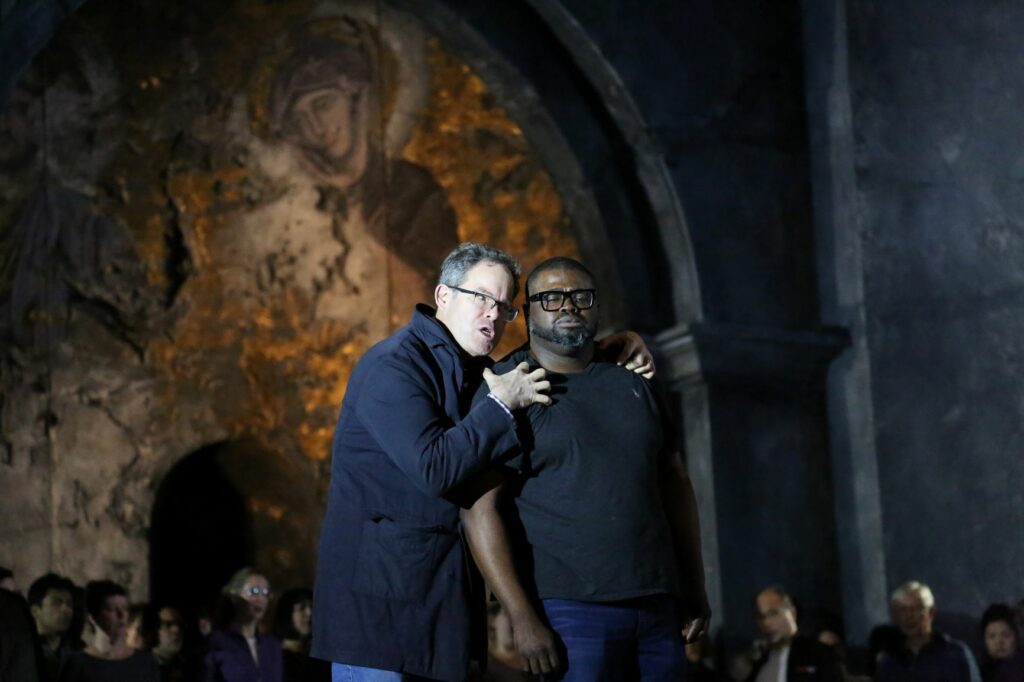
Gerald Finley (Iago) and Russell Thomas (Otello) in rehearsal for Canadian Opera Company’s Otello. Photo: Canadian Opera Company
The history of the role is one Thomas is well aware of. “There’s a whole lot of pressure on me as a black man to sing this role, as I’m sure it was difficult for Paul Robeson to do the Shakespeare play.” Debates around altering a performer’s appearance for certain roles court what he terms a “slippery slope” when it comes to authenticity and agency.
“I think that we have to be careful with this idea that darkening Anna Netrebko in Aida is blackface or darkening James McCracken in Otello was blackface—I don’t think that’s what this is. The character [of Otello] just can’t be white—it doesn’t work. It doesn’t work dramaturgically,” he says, echoing comments he made on the COC website. “It’s really a slippery slope and the minority artists will lose out every time. Just because [productions] don’t paint a white guy black doesn’t mean they’re going to hire a black guy.”
Specificity as related to racial presentation, in Thomas’ view, needs to take in all the vagaries of past and present while tying representation directly to material. “We can’t focus so much on the fact that Aida has to be played by a black singer—this is the problem,” he says. “If you do, then are you going to say Don Carlo has to be played by a Spaniard? Butterfly has to be Japanese? Turandot has to be Chinese? I understand everyone is very well-meaning in this [issue], and because blackface and yellowface have such an ugly past, we end up going too far in another direction. So do you just not do things? I find that to be very short-sighted. Are we not going to allow Asian singers to sing Manrico or other tenor roles? I think that’s a really bad thing for art.”
“It’s really a slippery slope and the minority artists will lose out every time”
Visual signifiers are, in Thomas’ view, absolutely necessary for specific characters. “You run the risk of not allowing an audience to see black people onstage, or brown people onstage. Even if it’s someone tanned or darkened to be black, you run the risk of not seeing that—and people become accustomed to not seeing that, which is equally a problem.”
The lack of racial diversity on stage is, Thomas explains, attributable to the lack of diversity off of it. Arts institutions do not, by and large, reflect the diversity of the communities they are meant to serve and be part of. ”All the big cities in North America, their stages do not represent their populations,” he states. “I think places are making an effort to effect those changes, but at what level? All facets and areas of classical arts need to look at this: the back office, backstage, the orchestra, boards, all of it. Diversity needs conscious effort —if there’s a consciousness, things will change.”

